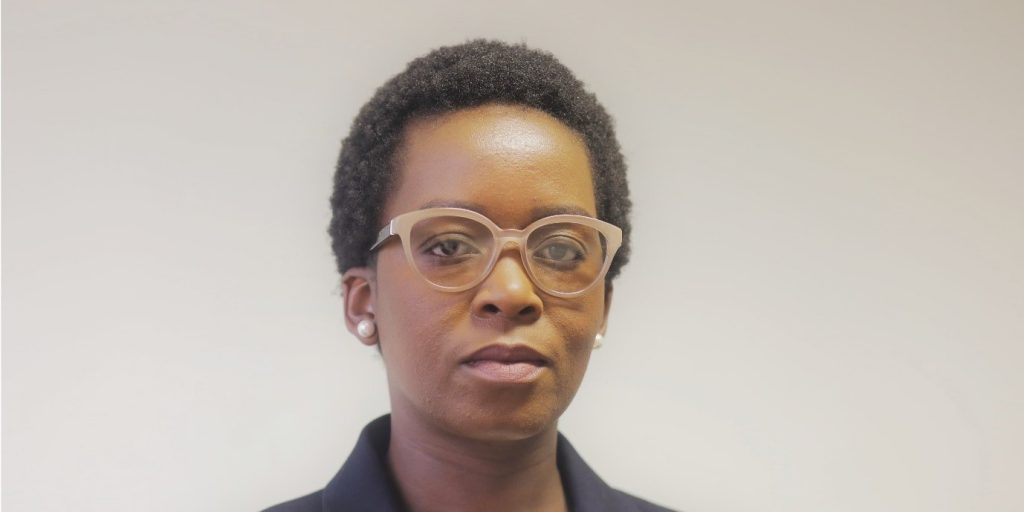Spotlight interview – Dr Bokani Mtengi

Dr Bokani Mtengi is a Lecturer in the department of Electrical, Computer and Telecommunications engineering at Botswana International University of Science and Technology (BIUST) since 2018. Dr Mtengi earned both her PhD in Electrical and Electronics Engineering (2015) and MEng in Electrical Engineering (2010) degrees from Howard University and a BEng (2004) in Biomedical Engineering from University of Hartford, U.S.A. Before joining BIUST, she worked as a Transmission electron microscopy (TEM) imaging engineer in Washington, DC for three years under the Howard Hughes Medical Fellowship. She has also worked as a Biomedical engineer for the Ministry of Health for three years, where at the time she was among the first 3 women with a Bachelor’s degree in Biomedical Engineering. She has received numerous scholarships including the Botswana Government scholarship for science and engineering to study abroad, The Frederick Douglas Fellowship for Master’s of Engineering and the BIUST Staff development fellowship. She is an advocate for equal gender opportunities in STEM education and professions.
Dr Akan Odon recently interviewed Bokani to find out a little about her experiences as a woman working in research in Africa.
Please briefly share with us your name and professional history
My name is Dr. Bokani Mtengi, a Lecturer at Botswana International University of Science and Technology, in the Department of Electrical, Computer and Telecommunications Engineering with teaching and research interests in power electronics and energy systems.
I have a PhD in Electrical and Electronics Engineering, a Masters of Engineering in Electrical Engineering both from Howard University in Washington, DC, and a Bachelor of Engineering in Biomedical Engineering from University of Hartford, U.S.A. Before joining BIUST, I held a 3 year postdoctoral position under the Howard Hughes Medical Fellowship, working as an Electron Microscopy Imaging Engineer.
I have a worked as a biomedical engineer for the Ministry of Health, Botswana, where at the time I was among the first 3 women with a Bachelor’s degree in Biomedical engineering.
I have received numerous scholarships including the Botswana Government scholarship for science and engineering to study abroad, The Frederick Douglas Fellowship for Master’s of Engineering and the BIUST Staff development fellowship .
Give us a sense of your current work and affiliations.
My current teaching and research interests are in the subjects of power systems operation and control, power electronics and renewable energy. I have been able to work on various renewable energy projects from smart devices powered with solar to solar harvesting and storage efficiency, given that Botswana gets plenty of sunlight yet still has challenges of providing reliable power to off grid locations. We have partnered with local private industries in power generation, transmission and distribution, mining, construction and the military for various engineering projects that aim to address some of the leading local issues.
How did you get to hear about and engage with RECIRCULATE as a project?
I am an alumni resident of the Recirculate project. In 2019 I was offered a residency opportunity to present my platform on advocacy for equal gender representation in STEM. Through the network of RECIRCULATE project members, I became aware of engage.
What has been your experience engaging with the RECIRCULATE project so far?
Working with RECIRCULATE project has been an amazing experience so far, affording me knowledge exchange and networking opportunities with some of the leading experts in various sectors in Africa, Women in STEM education leadership and entrepreneurship roles. I have been able to gain valuable knowledge in academic research and entrepreneurship and establish collaborations within the Africa network. One notable experience or networking opportunity is the membership to the Women Innovators Network of Africa (WINA), a platform that has been very instrumental in growing my portfolio in advancing advocacy in equal gender representation in STEM roles. The network offers an opportunity to share highlights of the work of remarkable and ordinary women in Africa who continue to break the glass ceiling through their unique work; mentoring, academia, business, management, leadership, advocacy.
What do you consider are the two biggest challenges that women in research in Africa face?
The two biggest challenges women in research face in Africa are collaboration opportunities and grants acquisition. In most universities, projects that attract significant grant funds are awarded to male PIs whereas Women researchers tend to compete in grants designed for women-led projects. The lack of collaboration opportunities limits the project scope and manpower capacity minimizing the chances of funding success.
Despite the significant progress made globally in closing the gender gap, gender inequality prevails everywhere and especially in developing regions like Africa. The number of women researchers employed in academia and research & development (R&D) is significantly lower than that of men. There is a major gender disparity between women and men researchers in places of work and their levels of responsibility. Major projects are led by male principal investigators (PIs) while women usually play minor supporting roles to project teams. In addition, women researchers are often concentrated in the lower echelons of responsibility and decision making, with limited leadership opportunities. In academia, women researchers are often lecturers, very few are professors and rarely research directors or principal investigators in major research projects. While many African countries have enacted Science, Technology and Innovation policies, some of which have gender-related objectives aimed at promoting women’s participation in research, they are rarely implemented. Despite the current state, actions are increasingly being taken across the continent to promote women’s participation and leadership in research. The African Union (AU) declared 2015 as the ‘Year of Women’s Empowerment and Development Towards Africa Agenda 2063’ and the ‘Science, Technology and Innovation Strategy for Africa-2024 (STISA 2024)’. In addition, initiatives such as the ‘L’Oreal- UNESCO for Women is Science International Award’ continues to be one of the most contested awards by women in research, globally. There are still gender biases and stereotypes embedded within institutions of higher learning, leading to lack of programmes for recruiting, retention and promoting women researchers.
What are your views of the state of gender in research in Africa?
Recognizing these challenges is the first step to addressing the gender disparity issues faced by women researchers. To mention a few, governments can establish gender-friendly policy frameworks to be adopted by research and academic institutions to promote recruitment, retention and promotion of women to leadership roles. Grants management agencies can amend their requirements to make research project teams gender inclusive. Each project should have representation of women and more funding to initiatives that promote women-led research projects. In addition, proper implementation of both international and local gender-friendly policies should be enforced by governments to benefit women. Government can fund local non-profit organizations aimed at addressing issues of gender disparity to promote national awareness within their countries. Establishing mentorship programmes by Women in senior level positions to help the next generation of women researchers realize their dreams. Education agencies in their respective countries, can design research intensive curricula for early learners to demystify STEM.
What do you think should be done to address these challenges this year?
Currently, I am one of the only two female teaching Staff members with a PhD qualification in the Faculty of Engineering and Technology at BIUST. In my personal experience, I have been able to get opportunities that highlight my achievements, opportunities that grow my skills; Lancaster RECIRCULATE project residency for research and entrepreneurship skills development, represented my institution in various speaking engagements for Women in STEM platforms; published in major journals in collaboration with my male colleagues. My team nominated me for my current position as the Vice President of the IEEE Region 8 Botswana Chapter position, Chairperson of Power Electronics and Energy Systems Research Group, Co-PI of three major funded projects. In addition, I am a member of various academic and administration committees at BIUST; IP Champion for the department of electrical, computer and telecommunications (ECT) engineering, coordinator of the ECT final year students research projects and final year students’ academic advisor. This is not to say there are no challenges. There have instances where I got more administrative duties than my male counterparts, been mistaken for a non-teaching staff, several times.
Any final thoughts or ideas for further engagement?
Creation of networks and professional development opportunities along with changing the societal narrative on gender stereotypes such as the choice for women to raise a family versus choosing a career in STEM are some of the initiatives that can promote more women participation in such field to close the gender gap.
All articles in The FLOW are published under a Creative Commons — Attribution/No derivatives license, for details please read the RECIRCULATE re-publishing guidelines.
